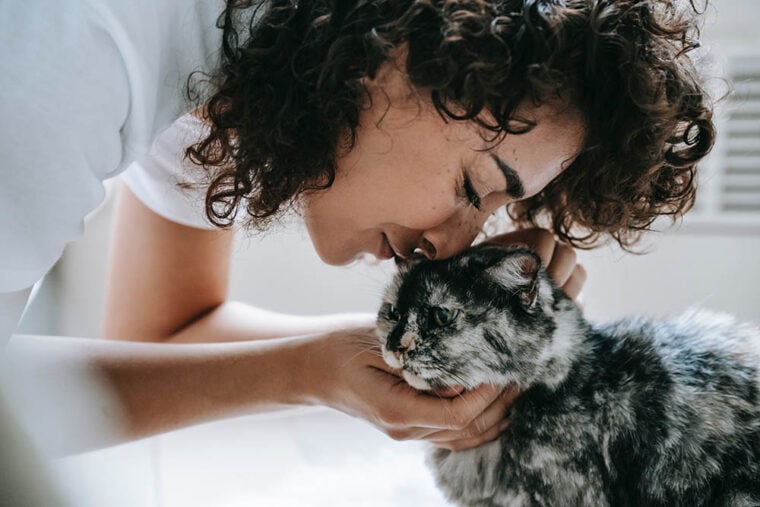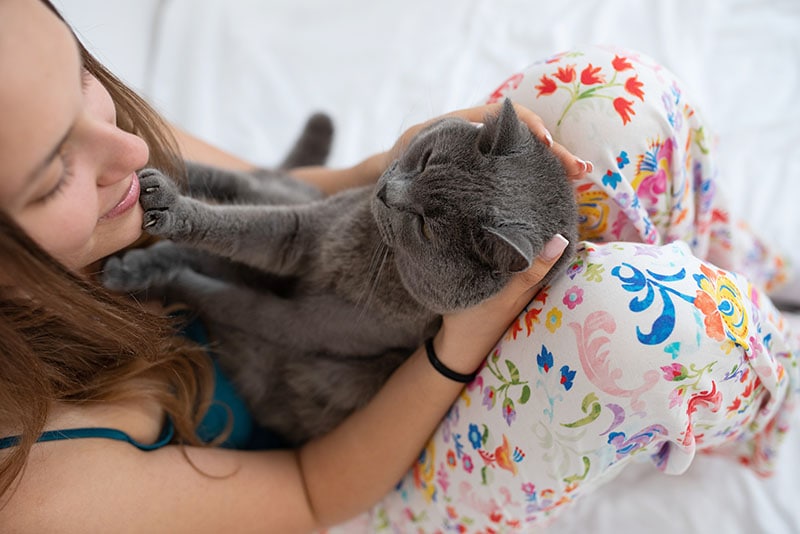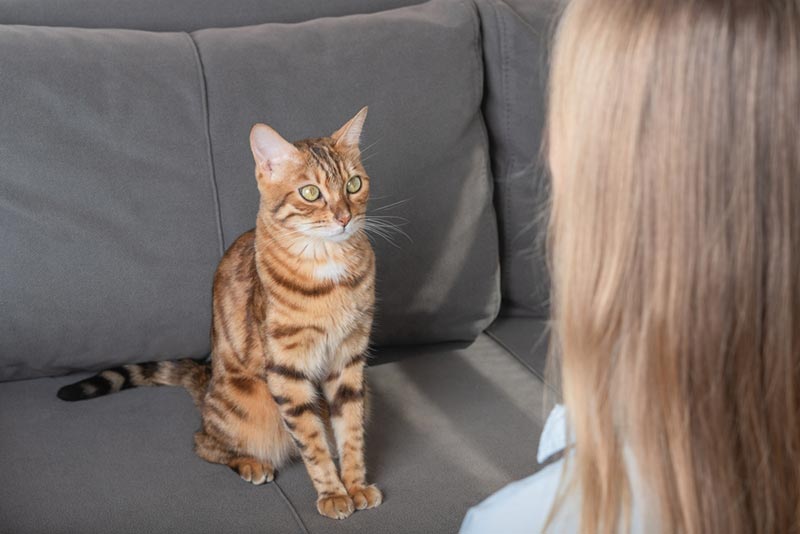
Click to Skip Ahead
The feline species possesses an exceptional sense of smell that far surpasses our own. But can our furry companions really sense human hormones? It does seem like they can, but there’s a lack of scientific evidence to support that claim. While it has long been known that an animal’s behavior can be affected by odors of another species, it remains unclear whether cats can detect and interpret the complex hormones emitted by human beings 1.
So, let’s explore what is currently known about kitties’ remarkable sense of smell and what is still a feline mystery.
What Are Hormones?
Hormones are chemical substances secreted by the endocrine system and released in the blood. These chemical messengers serve to coordinate various body functions, including growth, reproduction, sexual function, sleep, hunger, mood, and metabolism. Each hormone has a well-defined role in the body and how they interact with each other.

Why Do Cats Have Such a Keen Sense of Smell?
It’s no wonder that our feline friends have such an impressive sense of smell: Their noses are filled with up to 200 million olfactory receptors, enabling them to detect an impressive range of smells 2. (For reference, humans have “barely” 5 million receptors!)
Cats also have a specialized organ called the vomeronasal organ, located in the roof of their mouth behind their front teeth 3. It enables them to detect pheromones, which are chemical molecules emitted by most mammals, including humans. These chemical signals, imperceptible to our limited noses, serve as a silent language that conveys messages about an individual’s physical and emotional state.
With that in mind, let’s see what human hormones cats can—or cannot—distinguish with their powerful noses.
Can Cats Detect Human Hormones?
Human hormones have distinctive scents that are largely imperceptible to humans but are potentially discernible to animals with a heightened sense of smell. But while there is plenty of anecdotal evidence to suggest that cats do respond to certain human hormones, there is a lack of solid scientific evidence to back up that claim. Because humans do not generally rely on pheromones for communication, it is less likely that we produce a significant amount of them.

That said, it is believed that pet felines can pick up on certain chemical signals emitted by their humans. Some experts suggest that cats may be able to sense mood swings in their owners, such as when they are stressed, fearful, or sad. In fact, cats are known to be highly perceptive to changes in their environment and the behavior of their human companions and can pick up on subtle chemical cues associated with hormonal changes, like the menstrual cycle.
However, more research is needed to fully understand the extent of cats’ ability to sense and interpret human hormones. Even if it’s proven that our feline companions do have this ability, their interpretation of these signals is likely limited, and they probably rely on various other cues, such as human body language, to understand and respond to their owners’ emotions.
Can Cats Smell Pregnancy?
Whether cats can tell when someone is pregnant is a controversial topic. According to a few healthcare professionals, cats can detect the higher levels of estrogen, progesterone, and human chorionic gonadotropin hormone produced by the body during pregnancy. But while cats will certainly notice the change in behavior, increased body heat, and altered lifestyle habits of a pregnant person, there are no studies that prove that the increased levels of these pregnancy hormones lead to subtle behavioral changes in felines.

Nevertheless, countless cat lovers frequently recount instances in which their beloved pets exhibited unusual behavior when a family member was pregnant. Stories of cats gently resting on a pregnant person’s abdomen or showing heightened vigilance and protection toward them are not uncommon. While these anecdotes don’t provide definitive proof, of course, they do suggest that cats may indeed possess an innate sensitivity to hormonal changes that occur in their human counterparts.
Do Cats Know When You’re Feeling Low?
Some kitties seem to know when their owners are feeling low. They often display uncanny intuition when their human companions are distressed, whether it’s due to anxiety, sadness, or fear.
There are a few small studies that suggest that a cat can discern their human’s emotional state. Some cats will even modify their behavior according to their owner’s state of mind, such as rubbing against them more often and giving them affectionate nods. It seems clear that cats can distinguish signals based on certain human emotions, which would be the basis for the formation of a strong emotional bond.

Can Cats Smell Death?
The answer to this question goes beyond our current understanding of the extraordinary abilities of cats. That said, there is a world-famous case of a tortoiseshell-and-white cat that lived in a hospital in the early 2000s. This mysterious feline, called Oscar the Cat, apparently knew whenever a patient was about to pass away. Oscar’s fascinating story was published in the New England Journal of Medicine in 2007, which describes how this feline was incredibly accurate in knowing when death was near, mainly by sitting quietly on the bed of a patient in a terminal phase of illness.
He presided over the deaths of more than 50 residents of Steere House Nursing and Rehabilitation Center in Providence, Rhode Island. His simple presence at a patient’s bedside was seen by physicians and nursing home staff as an almost absolute indicator of impending death, enabling staff members to notify families. Oscar also provided companionship for those who would otherwise have died alone. Whether he could actually smell when the Grim Reaper was nearby remains a mystery, but it might make you wonder what other magical superpowers cats are hiding from us mere humans.
Side note: Oscar the Cat passed away peacefully at the grand age of 17, on February 22, 2022.
Tips to Keep Your Cat Safe
Whether your dear cat can smell your hormones or not, you still need to do everything in your power to keep them safe and sound, especially when they’re feeling stressed or anxious themselves.
Final Thoughts
Whether cats can smell human hormones is still a mystery. Although scientific research on this topic is limited, anecdotal evidence and a few small-scale studies suggest that cats do appear to be able to detect and respond to chemicals associated with human hormonal changes, but it is virtually impossible to distinguish if they are responding to hormonal changes or behavioral cues. However, even if they can’t, you’ll likely appreciate any extra attention that your cat wants to give you!
Featured Image Credit: Sam Lion, Pexels








